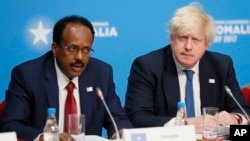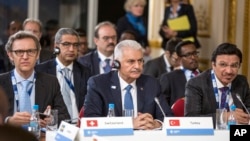Participants at Thursday's international conference on Somalia say they will support a plan aimed at enabling the country's fledgling and poorly-equipped army to defeat al-Shabab militants and take over national security from African Union troops.
Troops with the AU Mission in Somalia (AMISOM), consisting of more than 20,000 soldiers from five East African countries, are due to start leaving the country next year.
In anticipation of the pullout, the Somali government recently reached agreement with the country's federal states to strengthen the national army, police and intelligence agencies.
"We want to see the integration of Somali regional forces and an increase in Somali capacity, as this will be crucial in allowing the resumption of offensives against the remaining al-Shabab strongholds in southern Somalia," said British Prime Minister Theresa May, addressing the conference in London.
“As part of this pact we want to see more detailed plans for Somali security reform so that Somalia can take responsibility for its own security and enable the drawdown of AMISOM troops as conditions on the ground allow,” May added.
At the conference, Somalia appealed to the United Nations to fully lift a longstanding weapons embargo so the national army can obtain heavy weapons.
"Time has come for Somalia to be able to get access to qualitatively better weapons than terrorists," Somali President Mohamed Abdullahi Mohamed told the conference.
The president said his country also needs a "robust economic program" to fully recover from a quarter-century of war and chaos.
“The insecurity situation cannot be changed without addressing its root causes, which is abject poverty and mass unemployment. Too many of our young generation are sitting idle, creating fertile ground for terrorists to recruit from,” he said.
Now is the time for the international community to support the plan, said Djibouti's Ambassador to Somalia, Aden Hassan Aden.
"Somalis are fed up with lawlessness and its leadership is ready, and the international community is showing an interest to help Somalia. So we have to all seize the opportunity,” he said.
United Nations Secretary-General Antonio Guterres called for another $900 million in aid for the drought-stricken country, reports the Associated Press.
"Somalia now hangs in the balance between peril and potential,'' Guterres said at the opening of the conference Thursday. ”Here in London we can tip the scales from danger to safety.''
Mogadishu residents react
In Mogadishu, the capital of Somalia, where militants frequently carry out attacks, people are closely following the conference on national TV and live streams from the social media.
Abdiwali Abdullahi Husein, a resident in Mogadishu, said he thought this conference was no different from previous meetings on Somalia held abroad.
“It looks to me the same as the previous conference. Of course there is a change of time and people in power at the conference, but nothing major," he told VOA's Somali Service.
But another resident, Abdurahman Ali Khaire, believes the conference heralds peace and stability for Somalia. “I believe that this conference will result in better fruits than previous conferences, and it would extend an opportunity for the new government," he said.
Another resident critical to the conference says unless Somali leaders prove themselves effective and united in action, international support will not help.
“If a patient goes to a doctor and the doctor does not prescribe the proper medication, that would not cure the disease. Somali leaders must fix their problems and ask the world to assist,” said Salad Ilmi Ahmed. “You cannot put the cart before the horse.”
Riwadan Haji contributed to this report from London







